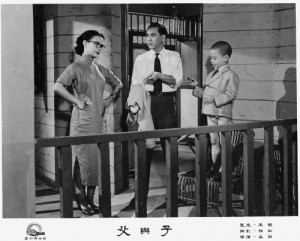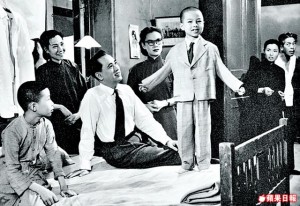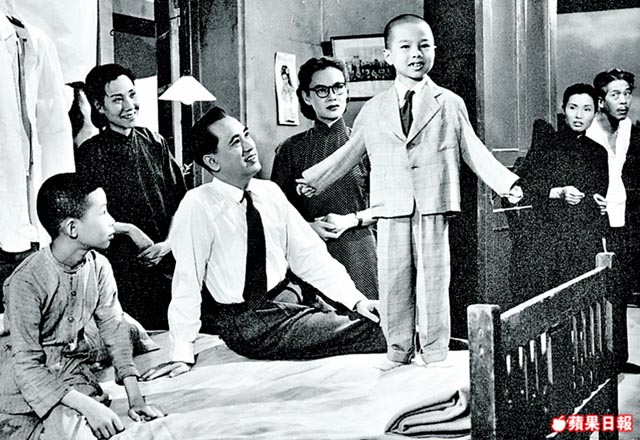‘Story of Father and Son’ (父與子)
Written by Ching Gong
Directed by Ng Wui
Hong Kong, 1954

 A Story of Father and Son is, just as the title suggests, a story of a father and his son. The film centers around Ng Kwan Sing (Cheung Wood-Yan), a lowly, but well dressed Hong Kong accountant in 1954, whose semi-estranged son Ha Jai or “Shrimpy” (Yuen Siu-Fai) comes to live with him following the death of his (Shrimpy’s) mother. Kwan Sing is a round-faced cheerful fellow who dreams of getting ahead. A man of impressionable conviction and appearance. Kwan Sing lays his suit beneath his mattress at night to maintain the press and “save time in the morning.” This is an act that Shrimpy, in an act of adorable imitation, will later emulate after his father buys him a matching suit or, “adult clothes! For a child!” as the landlord, in a shrill spectacle of cynicism exclaims.
A Story of Father and Son is, just as the title suggests, a story of a father and his son. The film centers around Ng Kwan Sing (Cheung Wood-Yan), a lowly, but well dressed Hong Kong accountant in 1954, whose semi-estranged son Ha Jai or “Shrimpy” (Yuen Siu-Fai) comes to live with him following the death of his (Shrimpy’s) mother. Kwan Sing is a round-faced cheerful fellow who dreams of getting ahead. A man of impressionable conviction and appearance. Kwan Sing lays his suit beneath his mattress at night to maintain the press and “save time in the morning.” This is an act that Shrimpy, in an act of adorable imitation, will later emulate after his father buys him a matching suit or, “adult clothes! For a child!” as the landlord, in a shrill spectacle of cynicism exclaims.
With secondary characters like Lao Li (Chow Chi Sing) –the bumbling friend/neighbor/coworker whose face-reading prediction causes Nq Kwan Sing to believe he will get a promotion at work (spoiler: he doesn’t get it)– and a series of actions based on unsubstantiated assumptions (what they say about assuming is made strikingly evident over and over), A Story of Father and Son has all the hallmarks of any stressful family disaster comedy. After all, the core of the narrative is the sudden appearance of a forgotten 10-year old son– what could possibly go right? A Story of Father and Son is funny and, despite the fact that it’s both out of its time and place, it doesn’t have any problems in finding a laugh from its audience, complete with notable cameos of famous actors of the time (Ng Cho Fan and Pak Yin) appearing as themselves when Shrimpy wanders onto a sound-stage while selling ribbons for his school.
There is a hidden yet distinct message etched across A Story of Father and Son that shines clearly against the gray and silver sets. It is a message of acceptance: the acceptance of yourself, the acceptance of your surroundings, and the acceptance of your class. This is a message that might seem pernicious from today’s standards where overcoming class has become the driving force of a generation or more, depending on your country of origin. In A Story of Father and Son, we find that the perceived impossibility of such a feat not only serves to alienate those who attempt to mount it but also their children. Sins of the fathers drive for prosperity. With such loaded implications, it’s no wonder the film is dusted with teeth-clenching moments that anticipate failure.
This isn’t an entirely misplaced message. For historical context, imagine living on a tiny island colonized by a foreign power with a population swelling from refugees who have crossed a small bay to escape your massive and potentially threatening neighbor. Under the circumstances, perhaps social climbing isn’t (and shouldn’t be) your primary objective, but maintaining a sense of well-being. It is in such times of societal anxiety where a film’s message becomes one of acceptance, one that doesn’t preach solely to the entitled but reaches out to the common circumstance. Hard work will improve your financial, social class and, yes, even romantic standing. A Story of Father and Son seems to imply the very opposite: Regardless of your hard work, you will not move up, but this doesn’t mean you shouldn’t work! The film’s characters learn the lessons of favoritism and the incestuous nature of political and business power – Ng Kwan Sing fails to get his promotion due exclusively to the boss’ son’s classmate (a man with no work experience) bidding for the same position – and the value of never overstepping your social class.
 What’s more, it is Kwan Sing’s optimism for success that turns out to be his tragic flaw. His belief that situations can improve with hard work and – as he learns shortly into the film– the right friends leads to misplaced alliances and ill-conceived actions. Even secondary characters come to accept this presumed truth. In one case, Kwan Sing’s neighbor Sek Suo (Wong Man Lei), a woman who works late into the night to pay her 12-year old son’s tuition fees (a young but haggard woman hunched feebly over an embroidery table, a single bulb above her casting harsh shadows of wear across the solitary room), must accept his choice to shine shoes for money instead of attend the luxury of public school.
What’s more, it is Kwan Sing’s optimism for success that turns out to be his tragic flaw. His belief that situations can improve with hard work and – as he learns shortly into the film– the right friends leads to misplaced alliances and ill-conceived actions. Even secondary characters come to accept this presumed truth. In one case, Kwan Sing’s neighbor Sek Suo (Wong Man Lei), a woman who works late into the night to pay her 12-year old son’s tuition fees (a young but haggard woman hunched feebly over an embroidery table, a single bulb above her casting harsh shadows of wear across the solitary room), must accept his choice to shine shoes for money instead of attend the luxury of public school.
It isn’t until the failure of Shrimpy’s birthday that this notion of accepting your economic class truly rings clear. As Shrimpy’s elite classmates are cradled away by their nursemaids and drivers from the communal housing block and taken back to their expensive homes in the Hong Kong Midlands (even today, one of the most famously expensive places to live in the world), his disillusioned father must confront his (and by default, his sons’) lot in life. It is at this point that Shrimpy’s public-school peers rush in, happy to wish their classmate a happy birthday and forget any former transgressions. A moment that, despite how defeatist it may seem to one set of eyes, is an uplifting end for a film so hedged on notions of failure.
Adriene Lilly


